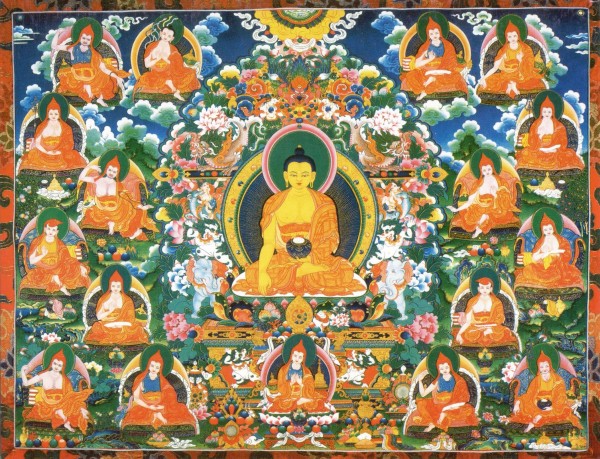- Home
- FPMT Homepage
Foundation for the Preservation of the Mahayana Tradition
The FPMT is an organization devoted to preserving and spreading Mahayana Buddhism worldwide by creating opportunities to listen, reflect, meditate, practice and actualize the unmistaken teachings of the Buddha and based on that experience spreading the Dharma to sentient beings. We provide integrated education through which people’s minds and hearts can be transformed into their highest potential for the benefit of others, inspired by an attitude of universal responsibility and service. We are committed to creating harmonious environments and helping all beings develop their full potential of infinite wisdom and compassion. Our organization is based on the Buddhist tradition of Lama Tsongkhapa of Tibet as taught to us by our founders Lama Thubten Yeshe and Lama Thubten Zopa Rinpoche.
- Willkommen
Die Stiftung zur Erhaltung der Mahayana Tradition (FPMT) ist eine Organisation, die sich weltweit für die Erhaltung und Verbreitung des Mahayana-Buddhismus einsetzt, indem sie Möglichkeiten schafft, den makellosen Lehren des Buddha zuzuhören, über sie zur reflektieren und zu meditieren und auf der Grundlage dieser Erfahrung das Dharma unter den Lebewesen zu verbreiten.
Wir bieten integrierte Schulungswege an, durch denen der Geist und das Herz der Menschen in ihr höchstes Potential verwandelt werden zum Wohl der anderen – inspiriert durch eine Haltung der universellen Verantwortung und dem Wunsch zu dienen. Wir haben uns verpflichtet, harmonische Umgebungen zu schaffen und allen Wesen zu helfen, ihr volles Potenzial unendlicher Weisheit und grenzenlosen Mitgefühls zu verwirklichen.
Unsere Organisation basiert auf der buddhistischen Tradition von Lama Tsongkhapa von Tibet, so wie sie uns von unseren Gründern Lama Thubten Yeshe und Lama Thubten Zopa Rinpoche gelehrt wird.
- Bienvenidos
La Fundación para la preservación de la tradición Mahayana (FPMT) es una organización que se dedica a preservar y difundir el budismo Mahayana en todo el mundo, creando oportunidades para escuchar, reflexionar, meditar, practicar y actualizar las enseñanzas inconfundibles de Buda y en base a esa experiencia difundir el Dharma a los seres.
Proporcionamos una educación integrada a través de la cual las mentes y los corazones de las personas se pueden transformar en su mayor potencial para el beneficio de los demás, inspirados por una actitud de responsabilidad y servicio universales. Estamos comprometidos a crear ambientes armoniosos y ayudar a todos los seres a desarrollar todo su potencial de infinita sabiduría y compasión.
Nuestra organización se basa en la tradición budista de Lama Tsongkhapa del Tíbet como nos lo enseñaron nuestros fundadores Lama Thubten Yeshe y Lama Zopa Rinpoche.
A continuación puede ver una lista de los centros y sus páginas web en su lengua preferida.
- Bienvenue
L’organisation de la FPMT a pour vocation la préservation et la diffusion du bouddhisme du mahayana dans le monde entier. Elle offre l’opportunité d’écouter, de réfléchir, de méditer, de pratiquer et de réaliser les enseignements excellents du Bouddha, pour ensuite transmettre le Dharma à tous les êtres. Nous proposons une formation intégrée grâce à laquelle le cœur et l’esprit de chacun peuvent accomplir leur potentiel le plus élevé pour le bien d’autrui, inspirés par le sens du service et une responsabilité universelle. Nous nous engageons à créer un environnement harmonieux et à aider tous les êtres à épanouir leur potentiel illimité de compassion et de sagesse. Notre organisation s’appuie sur la tradition guéloukpa de Lama Tsongkhapa du Tibet, telle qu’elle a été enseignée par nos fondateurs Lama Thoubtèn Yéshé et Lama Zopa Rinpoché.
Visitez le site de notre Editions Mahayana pour les traductions, conseils et nouvelles du Bureau international en français.
Voici une liste de centres et de leurs sites dans votre langue préférée
- Benvenuto
L’FPMT è un organizzazione il cui scopo è preservare e diffondere il Buddhismo Mahayana nel mondo, creando occasioni di ascolto, riflessione, meditazione e pratica dei perfetti insegnamenti del Buddha, al fine di attualizzare e diffondere il Dharma fra tutti gli esseri senzienti.
Offriamo un’educazione integrata, che può trasformare la mente e i cuori delle persone nel loro massimo potenziale, per il beneficio di tutti gli esseri, ispirati da un’attitudine di responsabilità universale e di servizio.
Il nostro obiettivo è quello di creare contesti armoniosi e aiutare tutti gli esseri a sviluppare in modo completo le proprie potenzialità di infinita saggezza e compassione.
La nostra organizzazione si basa sulla tradizione buddhista di Lama Tsongkhapa del Tibet, così come ci è stata insegnata dai nostri fondatori Lama Thubten Yeshe e Lama Zopa Rinpoche.
Di seguito potete trovare un elenco dei centri e dei loro siti nella lingua da voi prescelta.
- 欢迎 / 歡迎
简体中文
“护持大乘法脉基金会”( 英文简称:FPMT。全名:Foundation for the Preservation of the Mahayana Tradition) 是一个致力于护持和弘扬大乘佛法的国际佛教组织。我们提供听闻,思维,禅修,修行和实证佛陀无误教法的机会,以便让一切众生都能够享受佛法的指引和滋润。
我们全力创造和谐融洽的环境, 为人们提供解行并重的完整佛法教育,以便启发内在的环宇悲心及责任心,并开发内心所蕴藏的巨大潜能 — 无限的智慧与悲心 — 以便利益和服务一切有情。
FPMT的创办人是图腾耶喜喇嘛和喇嘛梭巴仁波切。我们所修习的是由两位上师所教导的,西藏喀巴大师的佛法传承。
繁體中文
護持大乘法脈基金會”( 英文簡稱:FPMT。全名:Found
ation for the Preservation of the Mahayana Tradition ) 是一個致力於護持和弘揚大乘佛法的國際佛教組織。我們提供聽聞, 思維,禪修,修行和實證佛陀無誤教法的機會,以便讓一切眾生都能 夠享受佛法的指引和滋潤。 我們全力創造和諧融洽的環境,
為人們提供解行並重的完整佛法教育,以便啟發內在的環宇悲心及責 任心,並開發內心所蘊藏的巨大潛能 — 無限的智慧與悲心 – – 以便利益和服務一切有情。 FPMT的創辦人是圖騰耶喜喇嘛和喇嘛梭巴仁波切。
我們所修習的是由兩位上師所教導的,西藏喀巴大師的佛法傳承。 察看道场信息:
- FPMT Homepage
- News/Media
-
- Study & Practice
-
-
- About FPMT Education Services
- Latest News
- Programs
- New to Buddhism?
- Buddhist Mind Science: Activating Your Potential
- Heart Advice for Death and Dying
- Discovering Buddhism
- Living in the Path
- Exploring Buddhism
- FPMT Basic Program
- FPMT Masters Program
- FPMT In-Depth Meditation Training
- Maitripa College
- Lotsawa Rinchen Zangpo Translator Program
- Universal Education for Compassion & Wisdom
- Online Learning Center
-
- Prayers & Practice Materials
- Overview of Prayers & Practices
- Full Catalogue of Prayers & Practice Materials
- Explore Popular Topics
- Benefiting Animals
- Chenrezig Resources
- Death & Dying Resources
- Lama Chopa (Guru Puja)
- Lama Zopa Rinpoche: Compendium of Precious Instructions
- Lama Zopa Rinpoche: Life Practice Advice
- Lama Zopa Rinpoche Practice Series
- Lamrim Resources
- Mantras
- Prayer Book Updates
- Purification Practices
- Sutras
- Thought Transformation (Lojong)
- Audio Materials
- Dharma Dates - Tibetan Calendar
- Translation Services
- Publishing Services
- Ways to Offer Support
- Prayers & Practice Materials
-
- Teachings and Advice
- Find Teachings and Advice
- Lama Zopa Rinpoche Advice Page
- Lama Zopa Rinpoche: Compendium of Precious Instructions
- Lama Zopa Rinpoche Video Teachings
- ༧སྐྱབས་རྗེ་བཟོད་པ་རིན་པོ་ཆེ་མཆོག་ནས་སྩལ་བའི་བཀའ་སློབ་བརྙན་འཕྲིན།
- Podcasts
- Lama Yeshe Wisdom Archive
- Buddhism FAQ
- Dharma for Young People
- Resources on Holy Objects
- Teachings and Advice
-
-
*If a menu item has a submenu clicking once will expand the menu clicking twice will open the page.
-
-
- Centers
-
- Teachers
-
- Projects
-
-
-
-
*If a menu item has a submenu clicking once will expand the menu clicking twice will open the page.
-
-
- FPMT
-
-
-
-
-
Happiness and suffering come from your own mind, not from outside. Your own mind is the cause of happiness; your own mind is the cause of suffering. To obtain happiness and pacify suffering, you have to work within your own mind.
Lama Zopa Rinpoche
-
-
-
- Shop
-
-
-
The Foundation Store is FPMT’s online shop and features a vast selection of Buddhist study and practice materials written or recommended by our lineage gurus. These items include homestudy programs, prayers and practices in PDF or eBook format, materials for children, and other resources to support practitioners.
Items displayed in the shop are made available for Dharma practice and educational purposes, and never for the purpose of profiting from their sale. Please read FPMT Foundation Store Policy Regarding Dharma Items for more information.
-
-
Mandala
18
Mandala Talk: Ven. Thubten Chodron on “Insight into Emptiness”
Ven. Thubten Chodron talks with Mandala editor Laura Miller in an audio interview about editing Wisdom Publications’ upcoming Insight into Emptiness by Khensur Jampa Tegchok Rinpoche. In their free-ranging conversation, Ven. Chodron also discusses her teacher Khensur Jampa Tegchok Rinpoche, the importance of studying emptiness and the process of editing a book among other things.
From Mandala July-September 2012
- Tagged: dharma in the modern world, mandala
- 0
14
The Seventeen Pandits of Nalanda Monastery
Maitripa College professor Jim Blumenthal writes the inaugural article for our new section Nalanda Masters, providing a brief introduction to the Seventeen Pandits of Nalanda Monastery. These pandits are “a grouping of seventeen of the most important and influential Mahayana Buddhist masters from India’s past.” His Holiness the Dalai Lama often refers to himself as a follower of their teachings and even wrote even wrote a poem in praise of the seventeen, “Illuminating the Threefold Faith: An Invocation of the Seventeen Great Sagely Adepts of Glorious Nalanda.”
From Mandala July-September 2012.
- Tagged: mandala, teachings and advice
- 0
13
Begin with Doubt by Thubten Yeshe (T.Y.)
Thubten Yeshe (T.Y.), FPMT registered teacher, provides suggestions for students without direct access to a teacher. She also takes a look at the role of doubt on a practitioner’s spiritual path: “Doubt is an essential aspect of our practice and should not be suppressed, but rather embraced.”
From Mandala July-September 2012.
- Tagged: mandala, teachings and advice
- 0
12
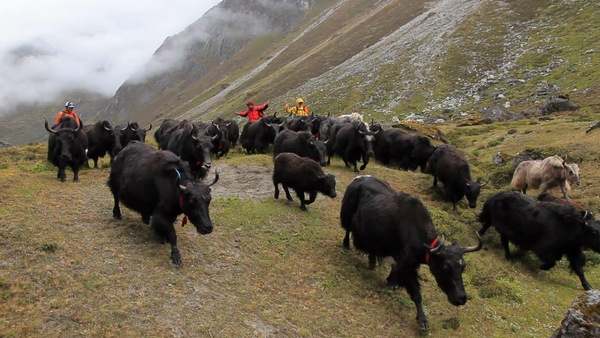
Liberated yaks just after their arrival in Rolwaling Valley, Nepal, September 2011
In 2011, more than 108 yaks’ lives were saved in Nepal through the efforts of Lama Zopa Rinpoche and Geshe Thubten Jinpa and with the support from FPMT’s Animal Liberation Fund and Amitabha Buddhist Centre in Singapore. In order to document the liberation, Geshe Jinpa brought along a camera crew and has just released an exciting new video called 108 Yaks: A Journey of Love and Freedom.
108 Yaks tells the story of the 19-day journey made by the rescued yaks from Dhudkunda, Nepal, where they were sold to Geshe Jinpa, to their new home in the lush pastures of the sacred Rolwaling Valley in northeastern Nepal, where the foot prints of Guru Rinpoche are said to be. The video takes us along on the stunning trek as a team of 22 herders and porters guides the gentle and peaceful yaks over rugged and treacherous mountain terrain.
“Rinpoche first spoke about his wish to rescue yaks in January 2011. He had heard rumours about the trading of yaks for meat up in the Himalayas of Nepal and expressed his concern,” Amitabha Buddhist Centre’s newsletter Tashi Delek reports. Rinpoche sent Geshe Jinpa to investigate. Eventually, Rinpoche arranged for the liberation of 115 yaks and for their care by the villagers living in Rolwaling.
As Lama Zope Rinpoche has advised, animal liberation is not just about saving animals from slaughter, but making sure the animals receive positive Dharma imprints for the rest of their lives through circling holy objects, hearing mantras and so forth.
Geshe Jinpa explained to Tashi Delek the reasons for rescuing the yaks and making the film 108 Yaks :
My whole point of doing this animal liberation is to dedicate for Rinpoche and the gurus’ long lives. But also it is to promote animal liberation, to tell people what animal liberation is and how it should be done. And also [share] what Rinpoche does to benefit sentient beings, with his words, his teachings and actions. Through that we contribute to the welfare of the animals. I mentioned to Rinpoche, by doing so, maybe this can get some support for Rinpoche’s animal liberation projects – building sanctuaries everywhere to accommodate these animals.
You can order 108 Yaks from The Foundation Store.
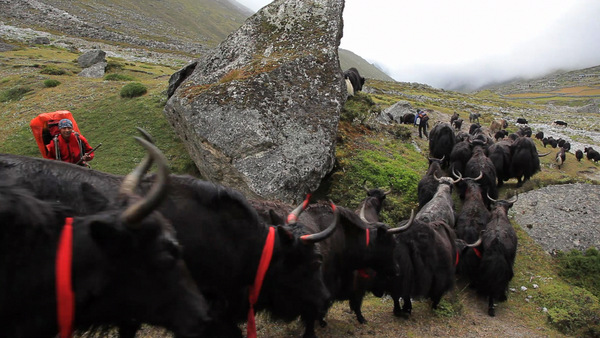
Liberated yaks in Rolwaling, Nepal, wearing cords blessed by Lama Zopa Rinpoche, September 2011
With 158 centers, projects and services around the globe, there is always news on FPMT activities, teachers and events. Mandala hopes to share as many of these timely stories as possible. If you have news you would like to share, please let us know.
- Tagged: animals, geshe thubten jinpa, lama zopa rinpoche, mandala, nepal, taking care of others, yaks
- 0
11
The Simile of a Cloud from “Insight into Emptiness” by Khensur Jampa Tegchok Rinpoche
Khensur Jampa Tegchok Rinpoche describes the simile of a cloud, a famous simile about the nature of reality from the Vajra Cutter Sutra (a.k.a. Diamond Cutter Sutra) from his new Wisdom Publications’ book Insight into Emptiness.
From Mandala July-September 2012.
FPMT makes the sutra available freely in multiple languages on fpmt.org. Also, FPMT Foundation Store has paper copies in English available for donation.
- Tagged: mandala, teachings and advice
- 0
8
New stories on Mandala Magazine online!
Over a dozen fresh online stories from the new issue of Mandala are waiting for you!
Here are a few highlights:
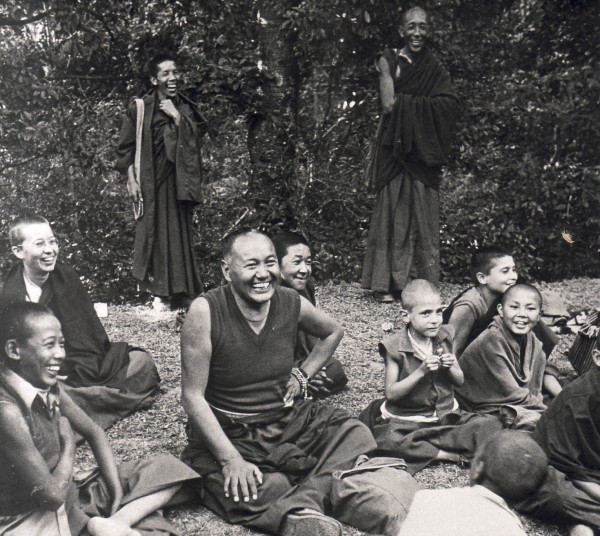
Lama Yeshe with Ven. Karin Valham, Lama Lhundrup, Lama Pasang and Kopan monks at a picnic in Bhalaju, Kathmandu Valley, 1976. Photo courtesy of Ven. Karin Valham.
In our continuing “Road to Kopan” series, Ven. Karin Valham describes her first Kopan course in November 1974: “Rinpoche’s and Lama’s teaching instantly became very personal. I was sitting way at the back having come late, and I was thinking they were talking to me, describing my life problems and giving me advice how to solve them by practicing Dharma. Lama Yeshe’s loving kindness helped us believe in ourselves and our potential as human beings. When he talked about ‘the fantasy projection of our dualistic mind,’ I knew exactly what he meant. I had found what I was looking for ‒ the Dharma ‒ and I wanted to become more like Rinpoche and Lama.”
Khensur Jampa Tegchok Rinpoche explains the simile of a cloud from the Diamond Cutter Sutra in an excerpt from the forthcoming book Insight into Emptiness. And we talk to the book’s editor, Ven. Thubten Chodron, in the first edition of our podcast “Mandala Talk.”
Sarah Shifferd takes the path into the world of online dating. “An online dating profile is a window into a mind and a life. It can be a work of art, a brash advertisement, a dispassionate report. First and foremost, it is a marketing tool for the self,” Shifferd writes. “My online dating practice threw me right into the deep end of the wisdom pool: describe this self accurately and even intriguingly, without becoming trapped in some notion of its inherent solidity.”
By Ven. Chönyi Taylor
I live in an incredible beautiful part of Australia: down south, near Wilson’s Promontory. It is so beautiful, and also so windy that Shallow Inlet, curving around behind the town, is considered one of the best places in the world for wind surfing. This same wind sweeps up the street and swirls around my house. Whatever the wind’s direction, it pulls off the leaves, throws the plants into a frenzy and wails around the chimney. This is not conducive to sitting outside under the veranda unless one likes wind. I installed bistro blinds. What had been a desolate, wind-swept veranda was instantly transformed into a large and congenial space.
Sometimes we need to face the elements, but sometimes they are too much.
As I increasingly experience the suffering of old age, my need for protection has become more important. My skin tears and bruises more easily. My hearing and sight are no longer accurate. Then there is my mind. Like many older people, I fear the possibility of dementia; I actually should be more fearful for the imprints, the karma, I create. Our positive karmic imprints can be fragile and need protection. The winds of desire with its graspings and aversions begin to howl and complain more loudly as our bodies crumble towards death. What to do?
My mind needs its own bistro blinds ‒ something that allows it to see the outside world without being tossed around by it, a way of staying in touch without being overwhelmed. A strong equanimity that can withstand the raging heat of desire and the painful hailstones of aversion would be good. But I cannot buy equanimity. It is something I have to make myself. It is made, so Buddha told us, from judging rightly, without bias, without attachment or aversion.
It is equanimity which gives us the chance to see the elements raging from the recesses of our minds with clarity. Our ego says, “I want everything good for me.” The stronger the ego, the more grimly we hang onto what we want, despite its impermanence, or franticly reject what we don’t want. The fierce heat of grimness, the hailstones of panic rage around. Equanimity is the first line of defence against the self-centred, self-grasping ego. Equanimity arises only when we are not concerned about our egos.
We need equanimity in so many ways. In meditation, equanimity refers to the balance between too much mental activity (excitement) and not enough (mental dullness). When we train in compassion we begin by developing the equanimity that sees all sentient beings as the same in the sense that we all want happiness and not suffering. We judge them rightly, correctly, without our tendency to label sentient beings as friend, enemy or stranger. With our clear equanimity bistro blinds, we are no longer thrown around by the turmoil that comes from such labels and our emotional reaction to the labels.
Since I cannot put up the inner bistro blinds alone, I need help, a qualified contractor. I am not alone. I call in the contractor. If we do need help, then it makes sense to ask for it. Here is a real life story:
“During my fifth year at primary school I began to experience strange voices inside my head,” Josh explained. “They seemed to replace normal sounds, such as wind in the trees or the noise of a person climbing a staircase. It was like a collision of thousands of human voices, which were aggressive and very frightening. It got so that every sound I heard was transformed into these voices, sometimes for hours on end and especially when I was trying to fall asleep at night. I felt so helpless and frightened and covered my ears with a pillow to block them out, but this only made them a little less loud. I often cried myself to sleep, but even my whimpering made them come.
“My parents didn’t know where to take me for help,” Josh continued. “Then Lama Yeshe came to Melbourne. I felt apprehensive about visiting him but he greeted me with extreme kindness and warmth. His beaming smile made me feel completely relaxed. He made me sit beside him on cushions and asked me about the voices. Then he poured some special medicine into a bowl of hot water, placed a towel over both our heads and together we inhaled the vapors. It was just like inhaling eucalyptus, and I felt wonderfully relaxed and protected by his presence. We did this for some time, then Lama gave me a big hug and told me I would never hear the voices again. I believed him and from that day on I never did.”1
Equanimity is the internal protector. It is held fast by the external protectors. Lama Zopa Rinpoche has given us lots of advice for protection from external storms, disasters and harmful energies. Much of this is available from the Foundation Store in the form of protection practices, cards, amulets and stickers. If you type “protection” in the search box at Lama Yeshe Wisdom Archives, it will come up with 160 references.
1. Josh Aitken, quoted in Adele Hulse’s Big Love and related in conversation with me many years ago. He is now a father himself and has had no more voices in his head or other signs of schizophrenia.
- Tagged: mandala, ven. chonyi taylor
- 0
6
The Life of a Hidden Meditator: Choden Rinpoche
His Eminence Choden Rinpoche is a compelling figure in the world of Tibetan Buddhism, known for meditating secretly in his small, dark, empty room for 19 years in occupied Tibet. At the request of Lama Zopa Rinpoche, Choden Rinpoche has now visited the West several times to give teachings and lead retreats.
From Mandala July-August 2000.
Choden Rinpoche will be giving various teachings at Ananda Dharma Center, in San Jose, California in June, July, and August.
- Tagged: mandala, your community
- 0
5
FPMT News Around the World

Saka Dawa light offerings in Bodhgaya, India, organized by Root Institute. Photo courtesy of Root Institute.
FPMT centers, projects and services around the world celebrated Saka Dawa, the day commemorating Buddha’s birth, enlightenment and parinirvana, yesterday. We rejoice in all of the events and activities that took place!
Here are highlights from a very few celebrations of Saka Dawa:
At the Mahabodhi Stupa in Bodhgaya, India, the Festival of Lights and Merit (FLAM) offered 100,000 lights June 3-5. FLAM is a project of Root Institute and makes light offerings and prayers during the four great Buddhist festivals. In addition to the 100,000 rainbow-colored electric lights that are carefully hung among the trees and walls of the entire Mahabodhi Stupa grounds, offering and dedication prayers are made on the advice of Lama Zopa Rinpoche, increasing the power of the offerings even further.
Amitabha Buddhist Centre in Singapore reported on Facebook that on Saka Dawa they liberated “about 800,000 lives (about 7 tons of la-la [clams] and cockles).”

Saka Dawa food offerings at Sera Je Monastery in India. Photo courtesy of FPMT Sera Je India.
FPMT Sera Je India shared photos on Facebook of Saka Dawa food offerings at Sera Je Monastery in India. [In other rejoicing news: This month, FPMT’s Sera Je Food Fund received US$115,000, which covers the next six months’ worth of meals for all 2,600 monks currently studying at Sera Je.]
On Saka Dawa, Istituto Lama Tzong Khapa (ILTK) consecrated their new Geshe Jampa Gyatso stupa. Geshe Jampa Gyatso taught 27 years at ILTK. Jhado Rinpoche presided over the cemerony. You can see more photos from the creation of the stupa on ILTK’s Facebook page.
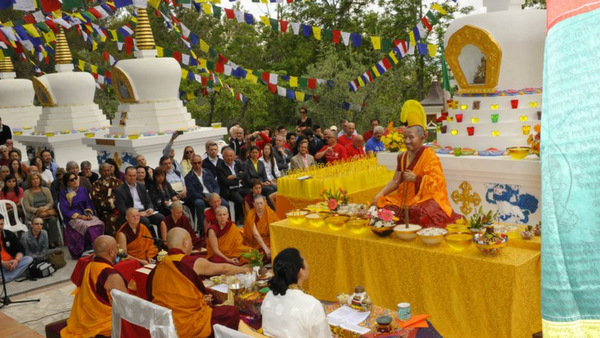
Consecration of Geshe Jampa Gyatso stupa, Istituto Lama Tzong Khapa, Italy, June 2012. Photo by Sirianni.
FPMT International Office celebrated Saka Dawa online by inviting students and supporters of Lama Zopa Rinpoche around the world to contribute to the Work a Day for Rinpoche fund, which supports the continuing realization of Rinpoche’s vast compassionate vision. Response thus far has been fantastic.
With 159 centers, projects and services around the globe, there is always news on FPMT activities, teachers and events. Mandala hopes to share as many of these timely stories as possible. If you have news you would like to share, please let us know.
- Tagged: amitabha buddhist centre, istituto lama tzong khapa, mandala, root institute, saka dawa, sera je food fund, work a day for rinpoche
- 0
4
Dharma in the Workplace
Is it possible to be a Buddhist and compete in your job? Or spread the Dharma in the workplace? Depending on your field, your motivation and your karma, it may not be easy. Or it may.
From Mandala September-November 2002
Consider putting the inspiration of this article into action by supporting Work a Day for Rinpoche, celebrated on Saka Dawa (today!), the day commemorating Buddha’s birth, enlightenment and parinirvana. Donations made to this fund go to FPMT International Office, which works to support Rinpoche’s vast vision. If you are inspired by Rinpoche’s limitless compassion, please consider making a contribution to the Work a Day for Rinpoche Fund.
31
Spirituality and Work: Antonyms or Synonyms?
Is work necessarily mundane? Is there a way to make it sacred? Psychologist Karuna Cayton explores the relationship between work and spirituality.
From Mandala June-July 2005.
- Tagged: mandala, practicing dharma in daily life, work
- 0
FPMT News Around the World
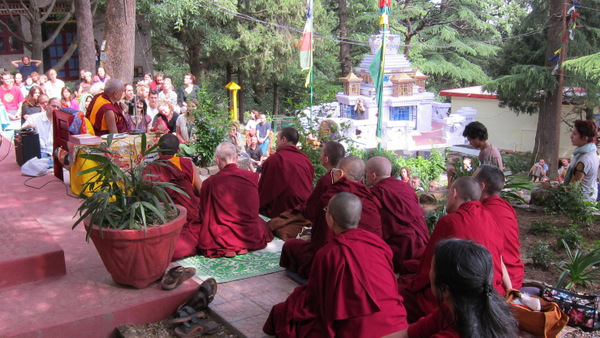
Lama Zopa Rinpoche at Tushita Meditation Centre, May 15, 2012. Photo by Ven. Roger Kunsang.
Tushita Meditation Centre in Dharamsala has been abuzz with activity. FPMT’s spiritual director Lama Zopa Rinpoche’s two-week visit earlier this month brought with it many blessing for Sangha and students. On May 15, he gathered the 100 students there for the course together to share with them a piece of the torma (ritual cake) from Khadro-la’s retreat.
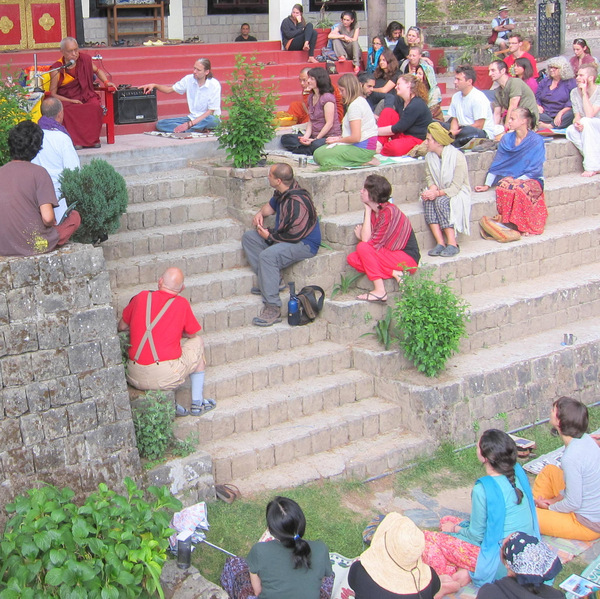
Lama Zopa Rinpoche at Tushita Meditation Centre, May 15, 2012. Photo by Ven. Roger Kunsang.
Two days earlier, Lobsang Sangay, the Kalon Tripa (Prime Minister of Tibet), visited Rinpoche at Tushita with Kalon Pema Chinnjor (the Minister for Religion and Culture). They met privately, and then Rinpoche led the Kalon Tripa on a tour of the center. Ling Rinpoche also paid Lama Zopa Rinpoche a visit at Tushita on May 10. Ling Rinpoche received a tour of Tushita as well and took time to address students.
Tushita celebrates its 40th anniversary this year. The center offers a full range of courses for both beginner and experienced Dharma students. In 2011, more than 9,000 people from all over the world attended their residential courses, retreats and drop-in sessions, with many more visiting for personal retreat and special events. Tushita will be featured in the next issue of Mandala, which comes out soon.
You can see many more photos from Rinpoche’s visit to Tushita, find links to recent teachings and learn about other happenings at the center on Tushita’s Facebook page.
With 159 centers, projects and services around the globe, there is always news on FPMT activities, teachers and events. Mandala hopes to share as many of these timely stories as possible. If you have news you would like to share, please let us know.
- Home
- News/Media
- Study & Practice
- About FPMT Education Services
- Latest News
- Programs
- New to Buddhism?
- Buddhist Mind Science: Activating Your Potential
- Heart Advice for Death and Dying
- Discovering Buddhism
- Living in the Path
- Exploring Buddhism
- FPMT Basic Program
- FPMT Masters Program
- FPMT In-Depth Meditation Training
- Maitripa College
- Lotsawa Rinchen Zangpo Translator Program
- Universal Education for Compassion & Wisdom
- Online Learning Center
- Prayers & Practice Materials
- Overview of Prayers & Practices
- Full Catalogue of Prayers & Practice Materials
- Explore Popular Topics
- Benefiting Animals
- Chenrezig Resources
- Death & Dying Resources
- Lama Chopa (Guru Puja)
- Lama Zopa Rinpoche: Compendium of Precious Instructions
- Lama Zopa Rinpoche: Life Practice Advice
- Lama Zopa Rinpoche Practice Series
- Lamrim Resources
- Mantras
- Prayer Book Updates
- Purification Practices
- Sutras
- Thought Transformation (Lojong)
- Audio Materials
- Dharma Dates – Tibetan Calendar
- Translation Services
- Publishing Services
- Teachings and Advice
- Find Teachings and Advice
- Lama Zopa Rinpoche Advice Page
- Lama Zopa Rinpoche: Compendium of Precious Instructions
- Lama Zopa Rinpoche Video Teachings
- ༧སྐྱབས་རྗེ་བཟོད་པ་རིན་པོ་ཆེ་མཆོག་ནས་སྩལ་བའི་བཀའ་སློབ་བརྙན་འཕྲིན།
- Podcasts
- Lama Yeshe Wisdom Archive
- Buddhism FAQ
- Dharma for Young People
- Resources on Holy Objects
- Ways to Offer Support
- Centers
- Affiliates Area
- Teachers
- Projects
- Charitable Projects
- Make a Donation
- Applying for Grants
- News about Projects
- Other Projects within FPMT
- Support International Office
- Projects Photo Galleries
- Give Where Most Needed
- FPMT
- Shop
Subscribe to FPMT News
Translate*
*powered by Google TranslateTranslation of pages on fpmt.org is performed by Google Translate, a third party service which FPMT has no control over. The service provides automated computer translations that are only an approximation of the websites' original content. The translations should not be considered exact and only used as a rough guide.It’s the foggy mind, the mind that’s attracted to an object and paints a distorted projection onto it, that makes you suffer. That’s all. It’s really quite simple.









